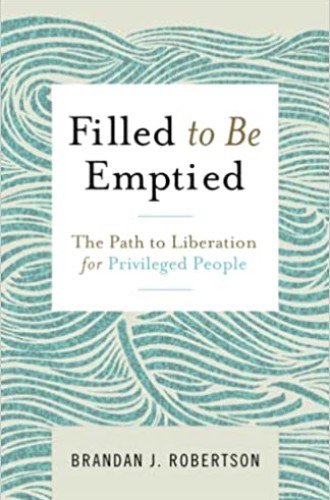A self-emptying of privilege
Brandan Robertson grounds his discussion of Christians and privilege in the kenosis hymn of Philippians 2.
Millennial pastor Brandan Robertson aims in this book to help Christians “to begin a conversation about our own privilege and how we might utilize it as a tool to lead us into a more faithful obedience to the way of Jesus by working for the common good of our neighbors.” He grounds this conversation in scripture, interpreting privilege through the kenosis hymn quoted in Philippians 2:5–11. Kenosis refers to self-emptying, and the hymn describes how Jesus first “emptied himself, taking on the role of the slave, born in human form,” and then “humbled himself by becoming obedient as far as death” (Robertson’s translation). The crucifixion, Robertson writes, is “the pinnacle of Jesus’ self-emptying. . . . At the moment of his death, Jesus has fully and finally emptied himself in order to demonstrate the delusion of the pursuit of power and privilege.”
The concept of Jesus having some privilege until the moment of his death may be hard for some Christians to take in. I’ll admit that my initial reaction was dismissive: But he wasn’t White! And he was impoverished! It’s not uncommon to struggle with the concept of privilege in this way, but Robertson uses his own experiences to show that marginality and advantage are not all-or-nothing. A gay post-evangelical Christian who grew up in a trailer park with a father who struggled with addiction, he writes about how his identity as a White male still offers him advantages not available to others. For example, his grades were mediocre, which “likely posed less of a threat to my ability to get into college than they would have for a person of color.”
Robertson’s words may pry open the hearts of those who have been closed to this conversation because they don’t see themselves as privileged. He makes it clear that privilege is morally neutral, not negative. It’s what we do with our privilege that matters, and the kenosis hymn provides a model for how Christians can grapple with and act on our privilege. We are called to “identify exactly what the dominant biases in our culture are, become aware of them in our own actions and thinking, and then actively work against them.” To help readers do this, Robertson delves into scripture with solid exegesis, weaves in stories from his own life, and cites snippets of wisdom from writers such as Richard Rohr and Brené Brown.
One chapter that I particularly appreciated grapples with the tension of Jesus calling both privileged people and those without much privilege to empty themselves—an imperative that has been historically exploited by oppressors and enslavers. Robertson notes that the Greek word doulou, traditionally translated as “slave” in Philippians 2, is the root of the English word doula:
Jesus became a slave to show those with no power and privilege and those with much that the true path to the world that the Jewish people prayed for and that the Roman Empire sought to establish through force was accessed through self-emptying, sacrificial service. He invited his followers to become doulas, or midwives, of a new world, amid the one that they were living in.
Here Robertson outlines the differences between activism and advocacy, arguing that both are essential in social reform. He offers a glimpse of his own work with the Black Lives Matter movement, including an instance in which he used his clerical privilege at a protest.
Another chapter captivated me by delving into churches’ relationships to power, including the use of financial resources for mortgages, building maintenance, and salaries. “Every day I would walk up to our campus and find a new person experiencing homelessness sleeping on our porch,” Robertson writes. “Every day I thought about what it would take to get that person some food, some clothes, and a cheap apartment.” As a pastor, I identified strongly with his wrestling, which eventually led his congregation to sell its property with the hope of reinvesting in a mortgage-free property that would enable it to support outreach more effectively. I appreciated Robertson’s humility in not providing answers to questions he raises about mortgages and salaries: he offers his own experience but does not preach that all churches should act similarly. The discussion questions at the end of this chapter are sure to benefit many church communities.
The kenosis hymn is followed by an admonition to “continue to work out your salvation with fear and trembling,” and Robertson ends the book with a reflection on fear. After naming the trauma caused by the fear-based theology he inherited, he discusses the fear many White people have about giving up their privilege—especially those who, like him, come from working-class communities:
As the systems of whiteness are dismantled, there will be an era of great discomfort and a sense of loss for many of us. But this is the consequence of the unjust systems that our ancestors created, and if we are to truly see the justice of God established on earth, we are required to pass through this moment of fear and trembling.
But privileged people shouldn’t fear things getting more “difficult” for us, but rather, we should fear the results of what will happen if things do not.
This may seem pessimistic, but two pages later, he writes this comforting sentence: “God seems to believe in humanity far more than most of us humans do.” I pray that he is right.





